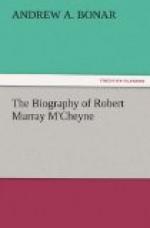During the first years of his college course, his studies did not absorb his whole attention; but no sooner was the change on his soul begun, than his studies shared in the results. A deeper sense of responsibility led him to occupy his talents for the service of Him who bestowed them. There have been few who, along with a devotedness of spirit that sought to be ever directly engaged in the Lord’s work, have nevertheless retained such continued and undecaying esteem for the advantages of study. While attending the usual literary and philosophical classes, he found time to turn his attention to Geology and Natural History. And often in his days of most successful preaching, when, next to his own soul, his parish and his flock were his only care, he has been known to express a regret that he had not laid up in former days more stores of all useful knowledge; for he found himself able to use the jewels of the Egyptians in the service of Christ. His previous studies would sometimes flash into his mind some happy illustration of divine truth, at the very moment when he was most solemnly applying the glorious gospel to the most ignorant and vile.
His own words will best show his estimate of study, and at the same time the prayerful manner in which he felt it should be carried on. “Do get on with your studies,” he wrote to a young student in 1840. “Remember you are now forming the character of your future ministry in great measure, if God spare you. If you acquire slovenly or sleepy habits of study now, you will never get the better of it. Do everything in its own time. Do everything in earnest; if it is worth doing, then do it with all your might. Above all, keep much in the presence of God. Never see the face of man till you have seen his face who is our life, our all. Pray for others; pray for your teachers, fellow-students,” etc. To another he wrote: “Beware of the atmosphere of the classics. It is pernicious indeed; and you need much of the south wind breathing over the Scriptures to counteract it. True, we ought to know them; but only as chemists handle poisons—to discover their qualities, not to infect their blood with them.” And again: “Pray that the Holy Spirit would not only make you a believing and holy lad, but make you wise in your studies also. A ray of divine light in the soul sometimes clears up a mathematical problem wonderfully. The smile of God calms the spirit, and the left hand of Jesus holds up the fainting head, and his Holy Spirit quickens the affection, so that even natural studies go on a million times more easily and comfortably.”
Before entering the Divinity Hall, he had attended a private class for the study of Hebrew; and having afterwards attended the two sessions of Dr. Brunton’s college class, he made much progress in that language. He could consult the Hebrew original of the Old Testament with as much ease as most of our ministers are able to consult the Greek of the New.




